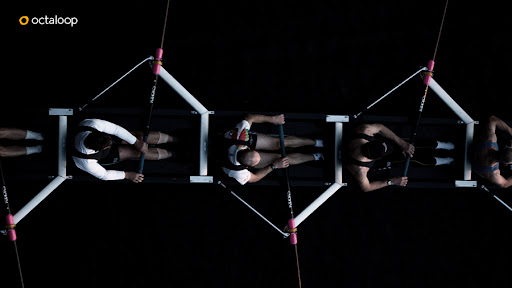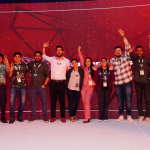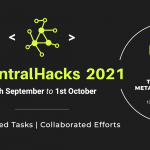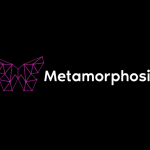Earlier this year, Octaloop conducted India’s largest blockchain based hackathon as part of The Road to Metamorphosis II, a virtual summit featuring talks and discussions about concepts and ideas from prominent members of the cryptocurrency community.
After a week-long test of skill and determination, mentor sessions with veteran blockchain developers, and many bug fixes, hackathon participants were able to present some truly innovative concepts on distributed ledger technology.
From voting systems and digital lockers to decentralized entertainment production and putting an end to corrupt bus conductors, no stone was left unturned among the ideas of 600+ developers that participated in the blockchain hackathon.
Building on networks like Ethereum, Harmony, and Elastos, the contestants, many of whom were new to the space, were able to harness the power of blockchain technology and develop applications, unlike anything we’ve seen before.
ElectroCrypt
From a team that goes by the name GenesisX comes a blockchain-based voting system that integrates with the cloud to provide all kinds of security and stability advantages over current solutions. Anjum Rashid, Temitayo Daniel, Gaurav Tiwari, and Ricardo Prins designed ElectroCrypt with the end-user in mind.
According to the team’s brief, they created this app to be accessible to anyone, regardless of their technical knowledge and experience. It also doesn’t require a cryptocurrency wallet to pay for transaction fees or cast votes, and instead registers ballot votes on behalf of the election organizer.
Built on the Matic network, a hybrid proof-of-stake and plasma-enabled Ethereum sidechain scaling solution. Using a central database and queuing systems powered by Google Cloud Services, the application creates a bridge to the decentralized Matic blockchain, where users can cast votes secured by cryptographic signatures.
DaanVeer
Just one individual made this decentralized crowdfunding application, and while it’s only a proof of concept, it’s a beautiful concept indeed. The app was inspired by the 2020 India Giving report from Charities Aid Foundation India, which states that 84% of individuals took part in at least one charitable activity in the last year.
However, the report also surveyed that 52% of people thought a lack of transparency hindered NGO donations. DaanVeer, an application built at the hackathon by Shivam Agrawal on the Ethereum blockchain aims to encourage people to donate through immutable and transparent transactions.
Charity organizations can register on the application and describe the cause for which they are raising funds. People can send money directly to these causes and see where and how the causes benefit from it. In a world where people prefer to donate to beneficiaries to prevent misappropriation of funds, an application like this could be a game-changer.
Blood Bank on Blockchain
Blockchain is gearing up to revolutionize the healthcare industry, especially in handling, storing, and managing medical records. Doctors, nurses, and other healthcare professionals worldwide are starting to rely on digitized clinical information more and more, giving blockchain hackathon participants all kinds of ideas.
Due to the COVID-19 pandemic, doctors must often diagnose patients remotely, and the ability to securely access the relevant records is crucial for this process.
Today, some systems enable the secure trade and utilization of clinical data using blockchain. In fact, they even allow users to restrict or provide access to their information selectively, and in some cases, even monetize their data by giving access to research foundations.
This hackathon application, proposed by Gokul Alex for the Harmony blockchain, utilizes ideas from his Semiott protocol (written using ZK-SNARK arithmetic circuits) to create a decentralized blood-bank.
The application harnesses the scalability and security of the Harmony protocol and implements the privacy-preserving smart contracts required for blood banks on Ethereum.
According to the application brief, Gokul and his team are in talks with various blood banks and hospitals to deploy their future platform.
DSOC
Continuing on the theme of healthcare, the Decentralized Storage of Cases (DSOC) is a project designed to provide accurate information on the number of COVID-19 cases worldwide. As the virus continues to spread, it’s important for countries, businesses, and individuals to have access to accurate and up-to-date data.
Countries can (and have) misreported data on the number of infected people, and this could lead to more needless deaths as we persevere in hopes of a vaccine. Centralized systems perpetuate this manipulation of data, and DSOC looks to eliminate inaccuracies by decentralizing information sources.
The two team members behind the application, Prajwal Anagani and Aditya Upadhyay, claim that it is unlike any other record-keeping blockchain, as it is simple and function-specific.
The app only records the necessary data on the blockchain, such as the patient’s name, ID, and test result. This could enable healthcare providers to contribute and update case data in real-time as patients are treated and remove the onus of data accuracy from a centrally controlled body.
Promoting Innovation
Despite the potential for blockchain to fundamentally change the workings of many industries worldwide, the technology is still mostly used in the financial services sphere, a realm that is always being pushed forward by the community every single day.
The concept of a cryptocurrency was made to act as a decentralized payments network, and to that end, developers are perpetually on the lookout for new, creative applications that bring value to the people.
Hackathons like DecentralHacks present us with the unique opportunity to incentivize developers to test the waters of blockchain development. It’s hard to look away from a prize pool of $15,000, even for experienced programmers.
At Octaloop, our goal is to foster a thriving community of people who are passionate about cryptocurrencies and blockchain technology, and hackathons let us entertain the most obscure yet incredible use-cases of these networks.
These programming marathons also help bring more developers into the industry by spreading awareness about the development process and sparking interest in the younger, more impressionable crowd of devs that have yet to find a niche.
A person can push an idea to its limits, but it takes a pair of fresh eyes, perhaps even several, before that idea can evolve creatively.
Blockchain is a very developer-centric field, and if we don’t keep providing them with avenues to solve the industry’s problems, interest and innovation will slowly fizzle out.
A challenge is never easy – it’s part of the definition — but even if challenges are demanding, they can still be quite enjoyable. Challenges test people’s abilities, and solving them provides a sense of satisfaction that isn’t reproducible in other scenarios.
The creativity on display at a blockchain hackathon doesn’t just provoke thought — it inspires action. Bitcoin was made to be a better solution to an age-old problem, and through hackathons like these, if we keep throwing questions for people to answer, better solutions are an inevitable by-product.






